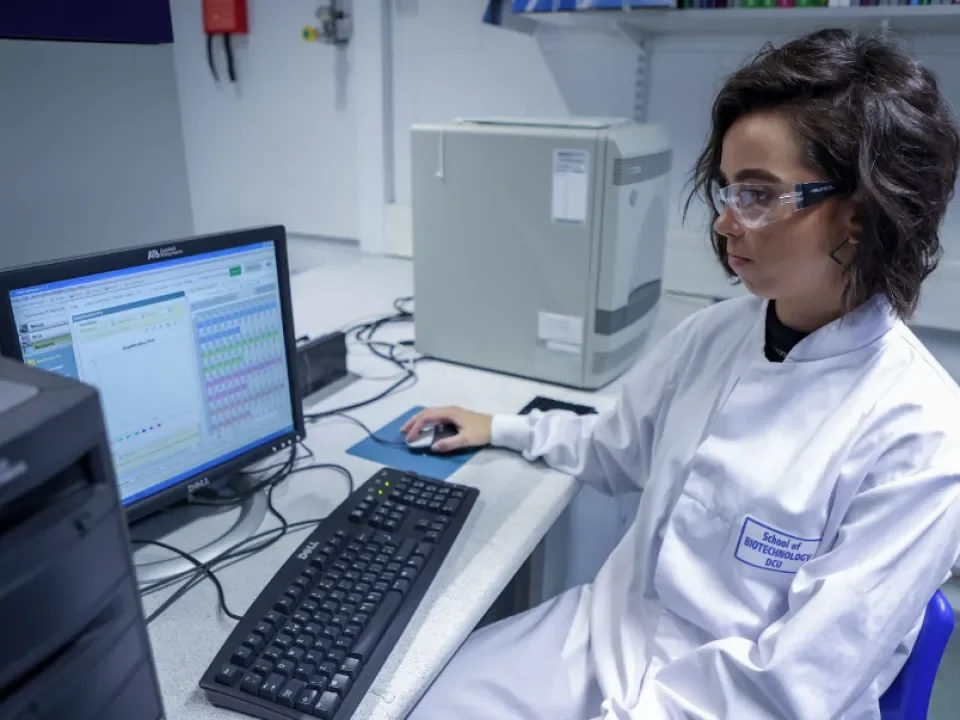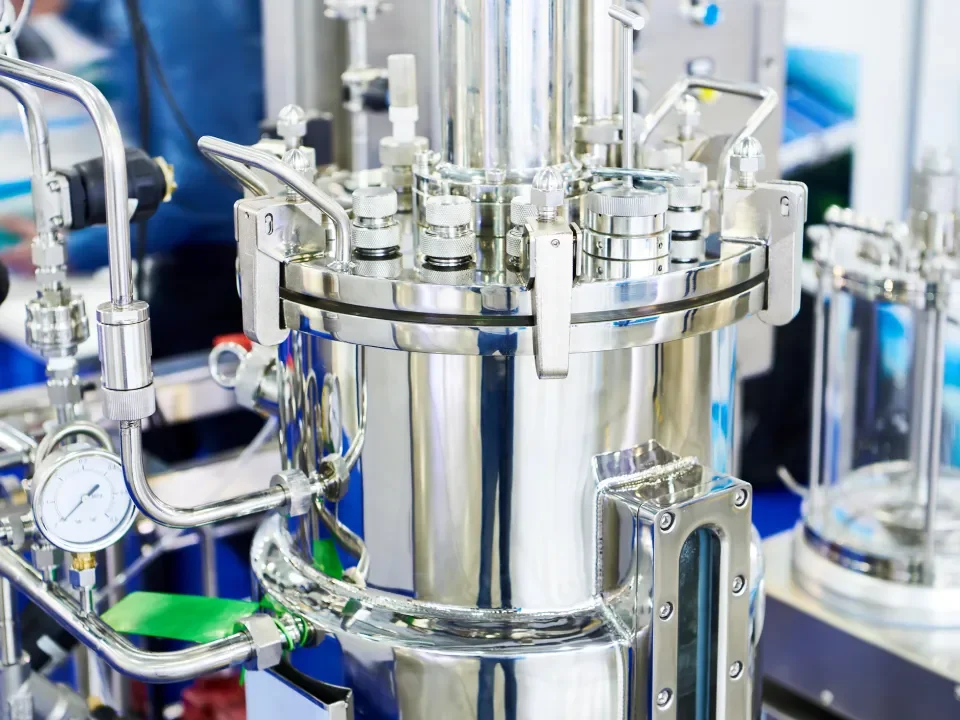Overview
You’ll study how diagnostics and therapeutics are revolutionising healthcare and medicine, as well as broaden your knowledge of new treatments like tailored cell-based therapies and gene modulation technologies. You’ll also learn how to build your critical and data analysis skills, as well as hone your academic writing skills.
Get set for a cutting-edge career
The blended-learning programme is a mix of face-to-face teaching and online modules, combined with hands-on experience in a research lab. This flexible approach means you can study wherever you are, whenever suits you.
Once you complete the course, you’ll be sought after for roles in biopharmaceutical and diagnostics industries, life science and clinical trial companies, as well as academic research centres.
Why DCU
DCU People
Careers & Further Options
Careers
Graduates will find employment in industry, clinical, healthcare and academic environments. This includes the diagnostics and biopharmaceutical industries, life science and clinical trials companies, as well as academic research centres.
In addition, our graduates have also gone on to pursue further research (e.g. a PhD) as well as gaining entry to Graduate Medicine programmes.
"DCU graduates are highly sought after by employers. Our Graduates work in environments ranging from large multinationals to SMEs, family businesses and start-ups across every sector.
DCU Careers Service has a number of learning and development initiatives in place for our students, giving them the skills they need for a successful career path."
Entry Requirements
- For admission to the MSc in Diagnostics and Precision Medicine candidates must have a primary degree that equates to an NFQ Level 8 Second-Class Honours, Grade 1 Award (H2.1) in a Life Science, Pharmaceutical, Medical or Chemical discipline.
- In addition, candidates who hold a primary degree (NFQ Level 8), with a Second-Class Honours, Grade 2 Award (H2.2) in one of the relevant degrees and with industrial experience will be considered.
- Recognition of Prior Learning (RPL) applicants are required to submit a cover letter along with their application under the Transcripts section of the portal, affirming their intent to apply for RPL. For more information on RPL see here.
- International candidates who are non-native speakers of English must satisfy the University of their competency in the English language. More information about DCU's English language requirements can be found here.
Programme Structure
The programme is delivered via a hybrid approach of face-to-face teaching and online delivery of modules, together with hands-on experience in a research laboratory.
- All taught components from the classroom in DCU including lectures, tutorials and workshops are recorded and made available through DCU's online platform Loop to enable flexible learning (44.2% of the programme content).
- Three modules on the programme are delivered online by our colleagues at Arizona State University (ASU) and are supported at DCU with tutorials (22.5% of the programme content), culminating in 66.7% of the programme available online.
- The remaining 33.3% of the course is dedicated to the research project which consists of a 12-week laboratory-based project (Option 1) or Masterclasses in Precision Medicine (Option 2). The laboratory-based masterclasses run over 2-3 days per week over a 3-week period and also include computational approaches and online activities.
This approach was designed to:
- Enable students to revise their curriculum by having access to their recorded lectures/tutorials and slides.
- Enable industry, medical and healthcare professionals to attend the programme remotely while continuing to work in full-time employment. Professionals working in full-time employment may also be able to undertake their research project in their place of work if working in a relevant industry (subject to terms and conditions).
Assessment is through Continuous Assessment and primarily consists of submission of assignments, in-class examinations and oral presentations/assessments throughout each of the three semesters. In-class examinations and oral presentations/assessments require students to be present in person in DCU.
Time commitment:
|
Online/blended/in-person: |
Blended |
|
Day/evening/weekend: |
Day time |
|
Number of days on campus per semester: |
36 |
|
Typical days(s) of week on campus: |
Wednesday, Thursday and Friday |
|
Typical hours per day on campus: |
2 - 6 |
|
Independent learning time - hours per week: |
50 |
|
Additional information: |
This programme is a mix of face-to-face (44%) and online lectures both from DCU and ASU (22%). All lectures from the classroom are recorded and made freely available to PT students and made available to FT students 2 weeks before any assessment. The project has 2 options, one of which has limited commitment to attending DCU (10 days in Semester 3). |
Please note this information is indicative only and subject to change.
Fees and Funding
Fees
How To Apply
To apply for this programme:
- All Applicants must apply through DCU's Student Application Portal which is available here. Here's a quick step by step guide if you need help with your application.
- Provide Academic Transcripts for each and every year of study with English translation if applicable.
- If applicable, provide evidence of competence in the English language as per DCU entry requirements. Please see link http://www.dcu.ie/registry/english.shtml.
Please note if you are a non EU student and require a study visa, you are not eligible to apply for part-time programmes as study visas are only granted for full-time programmes.
Application Deadlines
Applications will be accepted on a rolling basis until the programme is full or until:
- Applications now closed for NON EU and EU applicants.
Note applicants who require a study visa for the purposes of studying at DCU are advised to apply as early as possible.
All entry requirements should be met before the commencement of the programme.
Application Queries
For EU applicant queries, please visit https://www.dcu.ie/registry/eu-postgraduate-taught-admissions or email postgraduateadmissions@dcu.ie
For non EU applicant queries, please visit https://www.dcu.ie/registry/international-admissions-undergraduate-and-postgraduate or email internationaladmissions@dcu.ie
Commencement of Programme
The programme commences in September 2025.
Life On Campus
At DCU, our students can expect a unique campus experience. We are known for our excellent teaching and learning facilities, our active clubs and societies, and our great social and sporting facilities. All this makes DCU an exciting place to be.
DCU has three academic campuses; Glasnevin, St. Patrick’s and All Hallows (both in Drumcondra), all close to Dublin City centre.
They can be reached by public transport, Dublin Bus and Bus Éireann, with our Drumcondra campuses a ten minute walk from Drumcondra Train Station. Glasnevin is a 20 minute walk from St Patrick’s and All Hallows. They are also linked by Dublin Bus.
Each campus has a library (O’Reilly, Cregan and Woodlock Hall), study spaces, restaurants, and on-campus residencies. There are sports facilities on Glasnevin and St. Patrick’s, and there is a dedicated sports campus, St Claire’s, located near Glasnevin on the Ballymun Road.
DCU’s 19,000 students have access to exceptional teaching and learning facilities across our three academic campuses.
These include modern learning theatres, research centres, a new media and TV studio, radio/podcast studios, computer suites and advanced labs in the areas of Languages, Engineering, Physics, Chemistry and Biotechnology, as well as a Sports Performance centre and a training hospital ward. In 2021, we opened our first virtual reality ‘Leadership Lab’, which is located in our Business School.
We continue to improve and update our facilities. For example, construction of a new world-class STEM facility is underway on the Glasnevin campus. With capacity for an extra 3,000 STEM students, this facility will advance DCU’s international reputation for excellence in science and health, computing and engineering disciplines.
Studying in DCU isn’t just about course work. The university is rich in student life and activities.
There are more than 140 clubs and societies for students in DCU, with ‘Clubs & Socs’ days taking place on both the Glasnevin and Drumcondra campuses at the start of the academic year. They span everything from rugby to rock climbing, anime to jazz.
For many students, sport is an important part of the DCU experience. DCU’s Sports Complex boasts a 25 metre swimming pool, fitness centre gym, all-weather pitches and squash courts, as well as soccer, GAA and rugby pitches. DCU Dóchas Éireann, the university’s GAA club, is the largest third level Gaelic Games club in the country. Meanwhile, DCU Athletics has been Ireland’s highest achieving university club for many years. And DCU has dozens of other clubs to get involved in, from Archery to Weightlifting.
The Glasnevin campus is home to our purpose built, state-of-the-art student centre, The U, which serves the needs of a rapidly growing student body. Here, you will find the Student Leadership and Lifeskills Centre, performing arts and cultural spaces for students and the wider community, and the Entrepreneurship and Innovation Hub. Also located on our Glasnevin campus is The Helix, our renowned performing arts centre.
On our St Patrick’s campus, we have the Java Student Hub, a vibrant, warm and welcoming space where students can meet for coffee, play music, use the projector to watch events, or just relax. The walls of the Java Hub were designed based on the cultural history of St Patrick’s Campus, including the special references to the notable sporting history and history of the arts.
We have a number of academic, professional and social supports for students.
Student Advice & Learning Skills Centre - Offers a wide range of supports and services to students and advice
The Writing Centre - drop-in writing workshops for students through the academic year
Maths Learning Centre - provides maths support for students of all ability levels with maths modules
Student Learning - facilitate the transition from passive to active learning for students at DCU, by teaching study skills, nurturing critical thinking and building student confidence.
Careers work with students to help them on their professional journey into graduate employment.
Our student support team offers a comprehensive support programme, helping students make that all important transition into university life and focusing on building confidence and skills which are key to success at third level.

DCU Glasnevin Campus
FAQs
Is DCU all one campus?
DCU is a multi campus university - the Glasnevin, St Patrick's and All Hallows campuses. The St Patrick's campus is where the Education courses are taught and some of the subjects from the BA Joint Honours degree. There is a 20-25 minute walk between the campuses but there are buses and bikes available to go between them also.
Click here to see maps of all of our campuses
If I'm studying on the St Patrick's campus, can I use the library and sports centre on the Glasnevin campus?
Yes, all facilities such as sports and accommodation are open for all DCU students to avail of.
Are there libraries in DCU and if they have wifi and work stations?
We have a brand new state of the art four floor library on our St. Patrick's Campus which complements the existing library on the Glasnevin campus. There is free wifi, work stations as well as desktop computers.
Does DCU provide accommodation?
DCU does have on-campus accommodation for undergraduate and postgraduate students, and you can find out more and apply via the Accommodation Office webpage.







